EDWIN FIRTH, ENGLAND’S CHAMPION CORNET PLAYER - THE HISTORY OF A BRASS BAND FAMILY (By Squire Firth)
(Courtesy of Squire Firth. This article appears in Gavin Holman’s website: IBEW - The Internet Bandsman’s Everything Within (www.ibew.org.uk/misc55.htm)
Edwin Firth, born in Earby on 23rd December 1888, was the eldest son of eleven children to Squire and Clara Firth. Squire Firth had come to Earby from Queensbury, Bradford, in 1885 at the age of 20, and was an accomplished musician and cornet player, some reports say he came as a wandering cornet player (busker) others say that he was invited to join Earby Brass Band. The band had just received its first new uniform and was keen to attract good players, it also had the services of William Rushworth the regular conductor of Black Dyke Mills Band of Queensbury for which Squire Firth and his father played.
On 6th February 1886 Squire Firth married Clara Wright, one of the seven daughters of William and Margaret Wright of Schoolfields, Earby, (Clara's brother, Fred, also played in Earby Band at this time). They did not stay long in Earby after they married and moved to Huddersfield where Squire Firth had been offered the position of Solo Cornet player and Bandmaster of the Lindley Brass Band. It was here that their first child, Alice was born (who was later to marry James Lindley the son of the Earby Schoolmaster) but Clara returned to her parent's home at Schoolfields, Earby for the birth of her second child Edwin, the main subject of this article.
After three years at Lindley the family moved to Skipton where after a short time in the Army in 1890 Squire Firth took over as Landlord of the Wheatsheaf Inn in 1891. The Inn, situated on the High Street where the Halifax Building Society is today, was a 17th century building with a long and colourful history. It had stables for 6 horses and a yard from the High Street that could accommodate 30 head of cattle. In 1899 it was advertised as "Ye House of ye Olden Times."
The Inn was patronised by Irish cattle dealers and the many farmers who visited Skipton on market days but it closed and was demolished in 1908, one reason being that the cattle market moved from the High Street in 1906.
In 1892 Squire Firth took over as Conductor of the Skipton Old Prize Band and its headquarters were transferred from the Cock and Bottle Inn to a room at the rear of the Wheatsheaf Inn where the band made good progress. In 1896 the band entered 14 contests and only failed once to win an award. Squire Firth was also a brilliant cornet player, winning many prizes and gold medals at solo competitions, including first prize and cup at the All England Contest held at Penrith. This was the musical environment in which Edwin lived and was to serve him well in later years.
The success of Skipton Band had brought fame to its conductor and towards the end of 1896 he was engaged as professional conductor for the Leeds City Band and he also had several other bands under his leadership. The demands made by these bands meant that Squire Firth and his family of now six children had to leave Skipton and move to Bradford, the centre of the Brass Band Movement in England. An article in the British Bandsman of 1898 about Leeds City Brass Band says "with nearly all the same players the band has, during 1897, won all along the line, only being unplaced once at Band Contests, they have secured 19 prizes including 10 firsts, 7 seconds, 1 fourth and 1 fifth whilst under Mr. Firth's direction and speaks splendidly of his abilities as a teacher." In fact between 1896 and 1901 Squire Firth conducted over 20 different brass bands at contests and won 156 prizes, a record that has yet to be beaten.
It was at Bradford that Edwin started his musical career, first as a choirboy and then in 1899, at the age of 11, playing the cornet. He progressed rapidly with his playing and his tutors were the best in the country.
After 3 years at Bradford the family moved back again to the Wheatsheaf at Skipton and Squire Firth took over the band once again. He also formed the Skipton Permanent Orchestra in 1901 and was its first conductor.
Edwin now became one of the principal boys in the Parish Church Choir and in 1902 played his first Brass Band Contest, at Crystal Palace, London, with Skipton Band who were awarded 3rd prize. Edwin also started to enter contests for solo instrumentalists and after a few disappointments won first prize at a contest for under 16s at Bradford in 1904. This was the start of his successful career as a Soloist. In late 1904 the family moved back to Earby as trade at the Wheatsheaf Inn was declining. They bought a block of property no's. 4 to 8 Victoria Road from William Wright (Clara Firth's Father) and moved into no. 8. These properties still stand today between the Conservative Club and the Bus Station.
There were now 8 children in the family. Unfortunately one of the girls, Beatrice, had died at her grandparent's house at Schoolfields in 1901 aged 11 years. Edwin continued entering and winning Solo Contests all over the North of England and Midlands with conspicuous success and soon attracted attention as one of the most brilliant cornet players in the country. He became known as "The Boy Champion Cornet Player" and won over 40 gold or silver medals and four silver challenge cups. Edwin was also in demand for playing the trumpet, such as the obligate in Messiah and other sacred concerts with orchestra, organ or piano accompaniment. He also played as guest soloist with over 50 different brass bands including Brighouse and Rastrick, Black Dyke, and Wingate's Temperance. The first band that Edwin played solo cornet with was Barnoldswick at Crystal Palace in 1906, where the band gained 2nd prize, his father conducting. There is a rare photograph of Edwin taken with Earby Band in the same year.
As Edwin's fame increased it was not uncommon for groups of people to congregate at 8 Victoria Road to listen to him practising and on one occasion when he was ill straw was strewn on Victoria Road to deaden the sound of horse and carts passing his bedroom. Edwin's fame continued to grow but little did he know what fate had in store for him.
FODENS BAND, FAME, AND THE GREAT WAR
In the early 1900s the popularity of brass bands was at its height and almost every town and village had a band. Large numbers of people attended Brass Band Concerts and Contests and hundreds of bands competed. At some of the National Contests crowds of over 40,000 people were not uncommon and it is reported that 20,000 people attended the Contest at Hardraw Scar, Hawes. The top players in these bands were as well known as professional footballers are today.
In 1908 Edwin Foden, head of Fodens Motor Works in Cheshire, wanted to have the best brass band in the country. He travelled the country listening to concerts and contests offering employment to good players if they would join his band, not unlike football club managers signing up the best players today. The band was still in need of a solo cornet player so he went to listen to Edwin Firth who was playing in a contest at Hanley, Staffordshire. Edwin won the contest and Mr. Foden was thrilled and amazed at his wonderful playing. Not long after a letter arrived at 8 Victoria Road Earby inviting Edwin and his father to meet the directors of Fodens with the hope that Edwin would join their band. At this meeting Edwin signed a contract to play with the band for which he would receive 10/6d plus expenses for each rehearsal and 15s for every concert and contest, also a guarantee of work and accommodation. This was a considerable amount of money in those days, much more than his brothers and sisters were earning in the cotton mills in Earby.
Fodens Band now went from strength to strength and started to win contests at national level. In 1909 the band won the British Open Championship. In 1910 they won both the British Open and the National Championship and in 1912, 1913 and 1915 won the British Open Championship again. They were now the top band in the country if not the world and in 1913 were invited to play by Royal Command for King George V and Queen Mary. Edwin played a solo with the band as usual and the King was so impressed that he asked the band to play for him again the next day. Also in 1913 the band made some of the earliest brass band 78rpm recordings by Edison Bell on the Winner label which included 2 cornet solos, one called Pandora and the other called Cleopatra played by Edwin Firth. A lot of people in Earby bought this record that is now considered to be one of the classic early brass band recordings. Edwin also started to compose music for brass band and when the "BRITISH BANDSMAN" (a Brass Band Publication) had a competition for a new brass band march, Edwin won it with a march called "Westward Ho!" This march is still one of the most popular marches played. In fact, if you happen to hear a brass band playing in the park this summer ask them to play "Westward Ho!" by Edwin Firth, they will most probably oblige.
In January 1916 Edwin married Doris the grand daughter of Edwin Foden and not long after he was called up to join the army, the 28th London Regiment also known as The Artists' Rifles. The Regiment was posted to the Somme and Edwin took a cornet with him and played it whenever he could. The well known cornet player Arthur Laycock who had married and lived in Earby had told his brother Harold about Edwin. By chance Harold also in the army had been posted to the Somme and one day on hearing music coming from the trenches found it was Edwin playing his cornet. He introduced himself and Edwin was pleased to meet him, they talked about Arthur Laycock, Earby, and things back home. Edwin also explained that he had brought his cornet with him to practice so that he would be ready to join Fodens Band again after the war. A few days later on the 1st June 1918, Edwin and his comrades were making their way back to the trenches after a spell of duty when a shell exploded amongst them. Nearly all were killed outright, including Edwin who was 29 years of age.
The whole brass band movement was shocked to hear of Edwin's death and it caused great sorrow at Heather View, Earby where the family now lived. The war had been cruel to the family as it had been to most of the families in Earby. Edwin's brothers Walter and Wright had been severely wounded in the war and the only brother to remain unscathed was Ceres who was only 12 years old at the time (The author's father). Edwin's father never got over these tragedies and died a few years later aged 59. Edwin's six sisters were all talented musicians and singers and the last one Margaret (Madge) died in 2001 aged 98.
Whilst Edwin was in France his wife had given birth to a son Teddy, whom Edwin never saw, Edwin's wife Doris never remarried and died in 1991 aged 99, Teddy died in 1994 aged 75.
According to reports Edwin was a quiet unassuming person, who after playing a solo would quickly take his seat only more often then not to be called again to play an encore. He was small in stature and in his youth his father took a box for him to stand on when he played. His letters to his father were always addressed "Dear Sir." Newspaper and brass band press reports of the day are full of praise about Edwin's playing. Some say he was the finest cornet player in the country if not the world and Edwin is still talked about today as one of the best ever cornet players.
There is a memorial stone to Edwin decorated with a cornet in Thornton-in-Craven Church yard.
It is remarkable that Edwin Firth and Lloyd Hartley, born within a few years of each other in the small village of Earby received international fame in their chosen field of music.
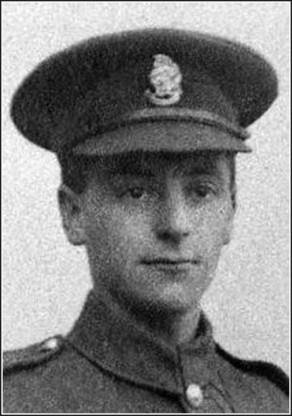
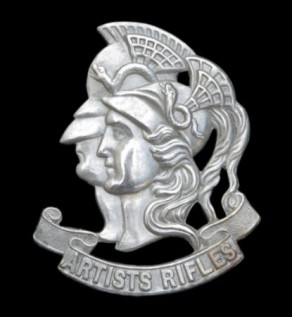
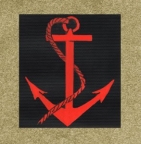

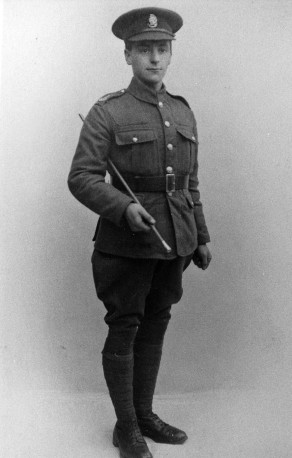
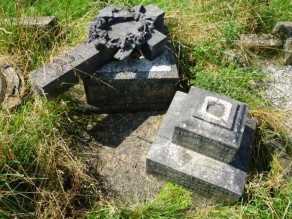
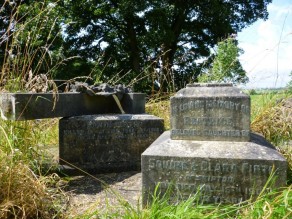
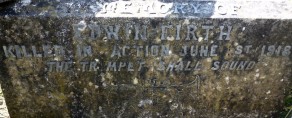





No comments yet.